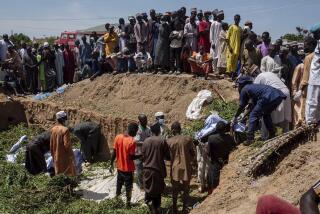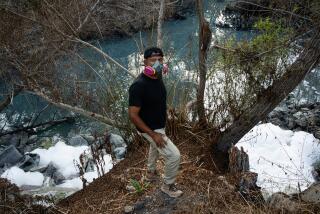Ivorians Incensed Over Toxins
- Share via
JOHANNESBURG, South Africa — Hundreds of people protested violently Friday in the commercial capital of Ivory Coast against the open-air dumping of toxic waste, beating a Cabinet minister and burning down the home of a port director implicated in the scandal.
The Health Ministry said seven people, including four children, had died in the West African country’s main city, Abidjan, after breathing fumes from the waste, which was unloaded at 14 open-air sites, including the main dump. There are fears that ground water could become contaminated as well.
The national unity government, set up to lead the country out of internal conflict and to new elections, resigned under pressure last week, leaving a skeleton administration in place. Several state officials have been suspended and seven people have been arrested, including the heads of the local firm, Tommy, which dumped the sludge.
The petroleum waste contains hydrogen sulfide and hydrocarbons. The chemicals can cause headaches, nausea, vomiting and diarrhea, and without adequate ventilation they can cause loss of consciousness, respiratory failure and death.
Greenpeace on Friday questioned whether the dumping of the waste, which was shipped by Dutch-based commodity trader Trafigura Beheer on a Panamanian-registered ship, the Probo Koala, may have violated a 1989 agreement banning industrialized countries from shipping toxic waste to poor countries.
Trafigura Beheer has denied wrongdoing, saying it handed over the waste to Ivorian firm Tommy to be disposed of properly. It said the waste unloaded in Abidjan was a mix of gasoline and caustic soda.
Reuters reported Thursday that the ship’s crew tried to unload waste containing high concentrations of sulfur in Amsterdam a month earlier and aborted the mission after processing companies demanded extra money to treat the waste.
The ship offloaded the waste in Abidjan on Aug. 19-21, leaving a foul, sulfurous smell that pervaded many areas of Abidjan. Thousands of panicked residents sought hospital attention as the death toll climbed.
After a report by the U.N. Disaster Assessment and Coordination team, or UNDAC, and a group of French experts, Prime Minister Charles Konan Banny said Thursday that his government had signed a deal with a French company to collect and contain the waste, an operation expected to begin Sunday.
The government launched an investigation to establish who was responsible for the dumping.
The UNDAC mission reported Thursday that despite the continuing stench, the threat had receded, with negligible levels of dangerous toxins remaining in the air. Authorities in Abidjan said they were measuring water quality three times a day and had found no evidence that toxic substances had entered the ground water.
The representative of the U.N. Children’s Fund in Abidjan, Youssouf Oomar, said in a telephone interview that much of the waste had evaporated but that rain Friday revived the smell as well as public anger.
Residents barricaded roads and burned tires in the Akouedo district near the main dump, and protesters dragged Transportation Minister Innocent Anaky Kobenan from his car, beating him and forcing him to inhale the fumes.
Anaky’s car was burned and he was seriously injured, Reuters reported.
A mob also burned the house of port director Marcel Gossio, one of the officials suspended while the investigation is underway.
Oomar said it was difficult to estimate how many people had been seriously affected by the waste. Although 26,000 sought medical advice, which was free, he said many of the reported symptoms were common medical problems. He said it appeared the waste carried no long-term carcinogenic risk.
Oomar said the most important thing was to clean up and contain the waste before it affected water or the food chain.
“It’s under control in the sense that now we know what the remedy is: to remove that waste and keep it in a secure condition and treat it,” Oomar said. “But people are still very angry.”
Greenpeace spokeswoman Helen Perivier in Brussels said it was too early to determine the waste’s origin or who was responsible. She said the intent of the 1989 Basel Ban on shipping such waste to poor countries was to fix responsibility with the shipping company and country of origin rather than with the receiving country.
“Our concern is that a very serious illegal shipment of hazardous waste has taken place,” she said. “There are too many questions for us to say exactly where the responsibility lies. However, it’s clear that something has gone terribly wrong.”
More to Read
Sign up for Essential California
The most important California stories and recommendations in your inbox every morning.
You may occasionally receive promotional content from the Los Angeles Times.












